

What Foods Contain Aspartame? Aspartame is typically used in sugar-free or low-calorie foods or drinks.
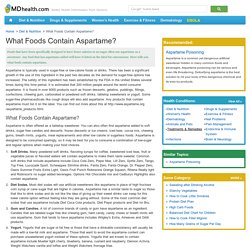
There has been a significant growth in the use of this ingredient in the past two decades as the demand for sugar-free options has increased. The safety of this ingredient has been established by the FDA in the United States several times during this time period. It is estimated that 200 million people around the world consume aspartame. It is found in over 6000 products such as frozen desserts, gelatins, puddings, fillings, confections, chewing gum, carbonated or powdered soft drinks, tabletop sweeteners or yogurt.
List of Products Containing Aspartame. The top 10 worst sources of aspartame. A List of Foods Containing Aspartame. From diet drinks to sweet treats, aspartame is one of the most popular low-calorie sweeteners.
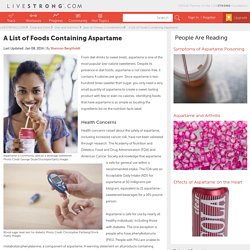
Despite its presence in diet foods, aspartame is not calorie-free, it contains 4 calories per gram. Since aspartame is two hundred times sweeter than sugar, you only need a very small quantity of aspartame to create a sweet-tasting product with few or even no calories. Identifying foods that have aspartame is as simple as locating the ingredients list on the nutrition facts label. Health concerns raised about the safety of aspartame, including increased cancer risk, have not been validated through research. The Academy of Nutrition and Dietetics, Food and Drug Administration (FDA) and American Cancer Society acknowledge that aspartame is safe for general use within a recommended intake. Aspartame is safe for use by nearly all healthy individuals, including those with diabetes. Top 4 Most Dangerous Artificial Sweeteners. Artificial sweeteners: sugar-free, but at what cost? By offering the taste of sweetness without any calories, artificial sweeteners seem like they could be one answer to effective weight loss.
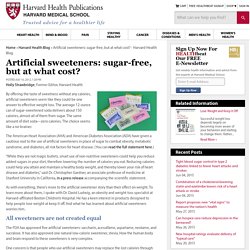
The average 12-ounce can of sugar-sweetened soda delivers about 150 calories, almost all of them from sugar. The same amount of diet soda—zero calories. The choice seems like a no-brainer. The American Heart Association (AHA) and American Diabetes Association (ADA) have given a cautious nod to the use of artificial sweeteners in place of sugar to combat obesity, metabolic syndrome, and diabetes, all risk factors for heart disease. (You can read the full statement here.) Artificial Sweeteners: Why You Should Completely Avoid Them to Stay Healthy. As the U.S. currently has an inadequate and deceptive labeling system, which fails in implicating the total health risks associated with certain foods and ingredients in foods, I decided to create a list of foods to avoid at all costs.
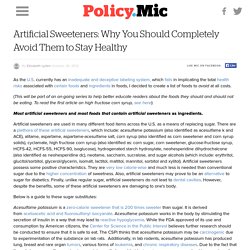
(This will be part of an on-going series to help better educate readers about the foods they should and should not be eating. To read the first article on high fructose corn syrup, see here): Most artificial sweeteners and most foods that contain artificial sweeteners as ingredients. Artificial sweeteners are used in many different food items across the U.S. as a means of replacing sugar. More Dangerous than You Ever Imagined.
By Dr.
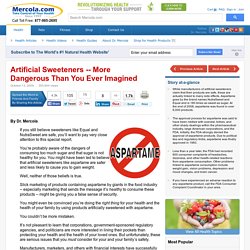
Mercola. Splenda & Vision problems? Dishydrosis? Splenda Side Effects. We are all familiar with the little yellow packages of Splenda that promise to satisfy our sweet tooth without the extra calories and the carbohydrates.
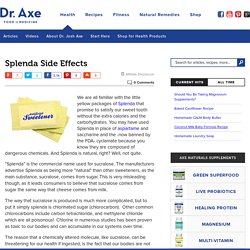
You may have used Splenda in place of aspartame and saccharine and the -now banned by the FDA- cyclamate because you know they are composed of dangerous chemicals. And Splenda is natural, right? Well, not quite. The Potential Harmful Effects of Sucralose (Splenda) Red Bull gives you.... increased risk of heart disease, say scientists. By Fiona Macrae for the Daily Mail Updated: 22:50 GMT, 15 August 2008 Just one can of Red Bull could raise the risk of heart attack or stroke, even in young people, researchers have warned.
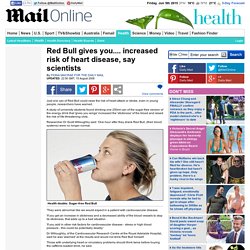
A study of university students found drinking one 250ml can of the sugar-free version of the energy drink that 'gives you wings' increased the 'stickiness' of the blood and raised the risk of life-threatening clots. Researcher Dr Scott Willoughby said: 'One hour after they drank Red Bull, (their blood systems) were no longer normal. Health doubts: Sugar-free Red Bull 'They were abnormal like we would expect in a patient with cardiovascular disease. 'If you get an increase in stickiness and a decreased ability of the blood vessels to stop its stickiness, that adds up to a bad situation.
SHOCKING SCIENTIFIC DISCOVERY!!! In a remarkable study recently conducted by SarcasTech Labs, a California-based research company, the popular “energy drink” Red Bull was discovered to have drastic side effects on frequent consumers of the product.
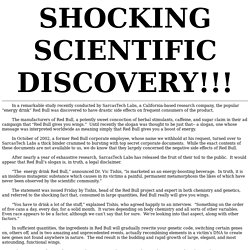
Energy Drink Health Risk Warnings Needed According to Researchers. According to researchers at Johns Hopkins University, the labels of popular energy drinks, such as Red Bull and Rockstar, should contain warnings about the amount of caffeine they contain and the potentially harmful side effects they could cause.
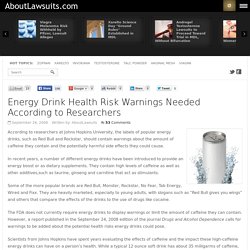
In recent years, a number of different energy drinks have been introduced to provide an energy boost or as dietary supplements. They contain high levels of caffeine as well as other additives,such as taurine, ginseng and carnitine that act as stimulants. Some of the more popular brands are Red Bull, Monster, Rockstar, No Fear, Tab Energy, Wired and Fixx. They are heavily marketed, especially to young adults, with slogans such as “Red Bull gives you wings” and others that compare the effects of the drinks to the use of drugs like cocaine.
The FDA does not currently require energy drinks to display warnings or limit the amount of caffeine they can contain. Josh Hamilton and Rangers blame star’s vision problems on too much caffeine. Josh Hamilton returned to the Texas Rangers lineup on Monday night after an optometrist diagnosed the vision problem that caused him to miss the past five games.
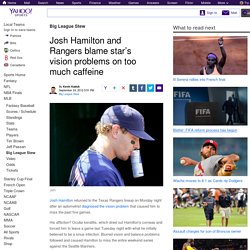
His affliction? Ocular keratitis, which dried out Hamilton's corneas and forced him to leave a game last Tuesday night with what he initially believed to be a sinus infection. Blurred vision and balance problems followed and caused Hamilton to miss the entire weekend series against the Seattle Mariners. Diabetes and eye health. Diabetes and eye health Taking good care of your eyes is essential.
Certain foods have nutrients that can help protect your eyes and may lower your risk of eye diseases. If you have diabetes, eye diseases are more common so eye health is especially important. Here are some tips to help you choose the best foods for eye health. The High Blood Sugar Connection to Eye Diseases. By Brenna Thompson, LD, RD Before starting with Nutritional Weight & Wellness, I never would have guessed my morning bowl of Kashi cereal with skim milk and a banana could lead me down a road towards cataracts, glaucoma or macular degeneration.
But now I know that these "healthy" foods were actually setting me up for a blood sugar rollercoaster. Each of these foods (cereal, skim milk and even the banana) is high in carbohydrates, which break down into sugar in the bloodstream. When carbohydrates are eaten in the right amounts and come from unprocessed foods (fruits, veggies and beans), just the right amount of insulin is released. However, when too much carbohydrate or sugar is consumed, the body releases too much insulin. Cataracts A cataract is a clouding of the lens in the eye. Surgery is often the go-to solution for people with advanced cataracts. Macular Degeneration. The Worst Foods for Your Eyes. The Worst Foods for Your Eyes Written by Kristy White One of the keys to improving eyesight naturally is maintaining well-balanced diet. Essentially, this means that you need to eat a variety of products from all food categories in order to supply your eyes with all the nutrients they need.
It is likely that the majority of the food products you consume are not harmful for your eyes. However, the way you prepare them and your eating habits can turn them into the worst foods for your eyes. It would be too much to say that something is totally bad for your vision however there are many food products that may have negative impact on your vision or speed up the progression of some common eye disorders. Junk food. Margarine. Deep fried foods. Vision. 7 Things That Damage Your Eyesight to Stop Doing Right Now ... → Health. Eye Care Tips For Post 50s: 5 Surprising Things That Are Bad For Your Vision. Eyesight naturally changes as we age. As we grow older, our eyes go from being able to refocus easily to having a harder time seeing detail, explained Dr. Rachel Bishop of the National Eye Institute. Myths about Your Eyes.
Health - Is reading in the dark bad for your eyesight? Foods to Help Protect and Improve Your Eyesight. 7 Bad Habits That Are Aging Your Eyes. Supporting people with sight loss. Nutrition for Your Eyes. Foods to boost your eyes and beat eye problems. Sian Porter, a consultant dietitian, identifies best food for healthy eyesSays brightly coloured fruit and vegetables provides vitamin A to retinaZinc helps eye health, good sources include lean meat, nuts and seeds By Jo Waters For The Daily Mail Published: 23:37 GMT, 20 April 2015 | Updated: 16:36 GMT, 21 April 2015 There is little doubt that good diet plays a key role in eye health.
The Worst Foods for Your Eyes. 7 Best Foods for Your Eyes. 13 Foods That Do Your Eyes Good. Nutrition in Vision: Try a Local Diet. 10 Eating Habits of the Highly Successful and Fit. Eating habits and behaviors: MedlinePlus Medical Encyclopedia. Find health choices for snacks and plan ahead. The Top Ten Healthy Eating Habits - 12wbt.com. Developing healthy eating habits will help you reach your goals, while ensuring you feel energised and able to enjoy life. Many people who struggle with their health or weight say they've tried every diet or food plan under the sun, without any long-term success. 9 Bad Eating Habits and How to Break Them. Healthy Eating. Healthy Weight: Losing Weight: Improving Your Eating Habits. Good Eating Habits Last a (Longer) Lifetime. ESL Flashcards, Printable PDF Worksheets & Picture Cards.
Food cards. Diet through life. Exam specification grids. Food.com - Thousands Of Free Recipes From Home Chefs With Recipe Ratings, Reviews And Tips.